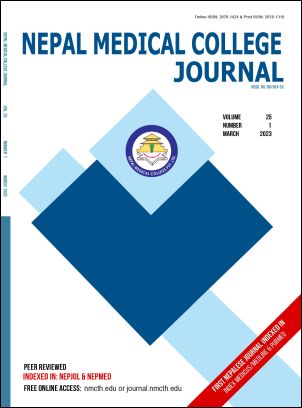Knowledge and practices on dengue prevention among the people of Buddhabhumi Municipality of Nepal: a cross-sectional study
DOI:
https://doi.org/10.3126/nmcj.v25i1.53375Keywords:
Dengue, knowledge, practices, preventionAbstract
Dengue infection is transmitted to humans through the bite of infected Aedes mosquitoes and about half of the world’s population now in risk of the dengue infection. The objective of the study was to assess the level of knowledge and practices on dengue prevention among the people of Buddhabhumi Municipality of Kapilvastu district of Nepal. A Cross-sectional study was done among randomly selected 181 households. Head of the households were the respondents for face to face interview. Pretested and validated tool was used for data collection. Statistical Package for Social Sciences version 20 used for data analysis. Percentages, frequency, mean the calculated and Chi-square test applied to measure level of association. Overall knowledge about dengue was good among 30.9% and overall 38.1% of the respondents had good dengue prevention practices. Caste/ethnicity and family type of the respondents are the factors associated with overall knowledge on dengue. Caste/ethnicity and educational status of respondents are associated with dengue prevention practices. For success of dengue prevention, programs should be designed to increase level of knowledge and also the translation of knowledge domain into real preventive measures.
Downloads
Downloads
Published
How to Cite
Issue
Section
License
Copyright (c) 2023 Nepal Medical College Journal

This work is licensed under a Creative Commons Attribution 4.0 International License.
This license enables reusers to distribute, remix, adapt, and build upon the material in any medium or format, so long as attribution is given to the creator. The license allows for commercial use.




